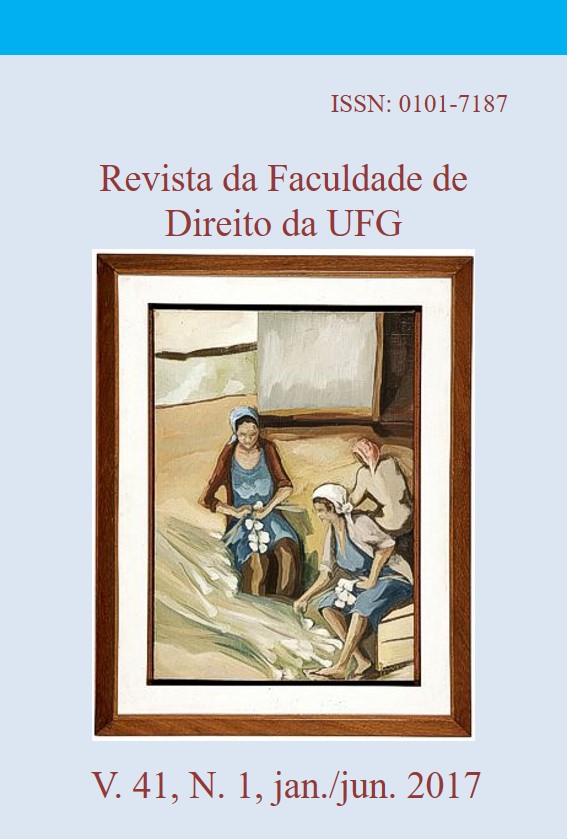DIREITO AMBIENTAL E AS DIVERSIDADES NATURAL E CULTURAL NO BRASIL: DIREITOS DA SOCIOBIODIVERSIDADE E SUSTENTABILIDADE NA CONSTITUIÇÃO BRASILEIRA - DOI: http://dx.doi.org/ 10.5216/rfd.v%vi%i.32708
DOI :
https://doi.org/10.5216/rfd.v41i1.32708Mots-clés :
Direito Ambiental, Diversidade, Sociobiodiversidade, Sustentabilidade.Résumé
Resumo:
Este artigo expõe a temática acerca das diversidades natural e cultural a partir de uma leitura do cenário sociobiodiverso brasileiro com os dispositivos constitucionais que refletem esta realidade de país megabiodiverso e detentor de uma multiplicidade de culturas e que devem ser refletidos pelo Direito Ambiental de forma integrada. Para tanto, inicia-se evidenciando o artigo 225 da Lei Maior brasileira, que trata do meio ambiente natural, destacando a biodiversidade e a sua devida proteção. No segundo momento deste artigo, ressalta-se a diversidade cultural do Brasil, a partir da exposição dos artigos 215 e 216 da Lei Maior brasileira, que traz os contornos do meio ambiente cultural. Após estes apontamentos, o terceiro momento do presente trabalho intenta realizar uma aproximação entre sociobiodiversidade e sustentabilidade, para tornar esta um paradigma de desenvolvimento em consonância com o reconhecimento e proteção das referidas diversidades, garantindo o direito ao meio ambiente ecologicamente equilibrado e a valorização das diferentes culturas e seus saberes vinculados à biodiversidade – sociobiodiversidade. Quanto aos métodos utilizados para a elaboração do presente artigo, foi utilizado o dedutivo enquanto abordagem e o monográfico enquanto procedimento. Optou-se pelo primeiro, pois a partir da relação entre os dispositivos constitucionais que tratam do meio ambiente natural e cultural, se pretendeu chegar a uma conclusão mais ampla, envolvendo os conceitos de sociobiodiversidade e sustentabilidade. Quanto a opção pelo segundo método, esta se deu em decorrência da pretensão em analisar o tema aqui proposto em profundidade, observando seus diferentes aspectos – jurídico e socioambiental –, de modo a explicá-lo de maneira mais integrada e analítica possível.
Abstract:
This article exposes the theme about the natural and cultural diversity from a reading of the Brazilian sociobiodiverse scenario with the constitutional provisions that reflect this reality megabiodiverse country and a multiplicity of cultures holder and that should be reflected by the Environmental Law seamlessly. For that, starts showing article 225 of the Brazilian Higher Law, which deals with the natural environment, biodiversity and stressing its necessary protection. On the second moment of this article, stands out the cultural diversity of Brazil, from the exposure of articles 215 and 216 of the Brazilian Higher Law, which brings the contours of the cultural environment. After these appointments, the third moment of the present work tries conduct a approach between sociobiodiversity and sustainability, to make this a paradigm of development in accordance with the recognition and protection of these diversities, guaranteeing the right to an ecologically balanced environment and the appreciation of different cultures and their knowledge related to biodiversity - sociobiodiversity. As to the methods used in the preparation of this article, while the deductive approach and the monographic while procedure was used. We opted for the first, because it from the relationship between the constitutional provisions dealing with the natural and cultural environment, it was intended to reach a broader conclusion, involving the concepts of sociobiodiversity and sustainability. As the option for the second method, this occurred as a result of the claim to analyze the theme presented here in depth, noting its different aspects - legal, social-environmental - in order to explain it in a more integrated and analytical manner possible.
Téléchargements
Téléchargements
Publié-e
Comment citer
Numéro
Rubrique
Licence
Les auteurs qui publient dans cette revue accordent à Revista da Faculdade de Direito da UFG une licence mondiale libre de droits, soumise aux termes et conditions de la Creative Commons Attribution 3.0 Brasil Legal License Creative Commons Attribution License
Les auteurs concèdent à RFD UFG tous les droits d'auteur sur les articles qui y sont publiés, qui les conservent en exclusivité jusqu'à l'avènement du domaine public sur ceux-ci.
























